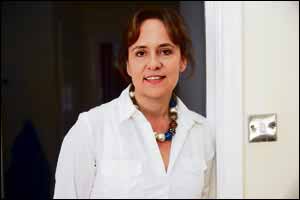|
PROFILE Sharon overcame the 'shame' of her Sephardi heritage to record histories | |
SHARON Rapaport grew up in Jerusalem feeling ashamed of her Sephardi heritage.
As education director of Sephardi Voices UK, she is now making amends by recording the stories of Middle Eastern and North African Jews who came to the UK. "My family were Sephardi, living 10 generations in Hebron, originally from Iraq and speaking Ladino," she told me. "When I was young my grandmother used to only speak in Ladino. But when you are young you really don't care. "At the time I didn't want to listen to her because in Israel it was a time of just German-Jewish culture. Sephardi culture was not the right thing. "I grew up in a Jerusalem neighbourhood inhabited by many prosperous Sephardi families and witnessed first-hand the marginalisation of their community. "Their histories, culture and particular customs were always ignored and never granted cultural legitimacy. It was a very Ashkenazi hegemony. "There was cultural imperialism in Israel. We were never interested in Sephardi culture." Ironically, it was through documenting the Holocaust stories of Ashkenazi survivors for Yad Vashem that Sharon became interested in oral history, which she now uses to document her Sephardi heritage. After graduating from Tel Aviv University, Sharon began her career on Israeli television, as a researcher for the 5 o'Clock News. Simultaneously, she was working for Yad Vashem. She said: "My first film was about a Yekke, a German Jew, who went to Tel Aviv's Café Habima on Fridays for coffee, where the German Jews had a kind of world of their own. "The film was about German Jews who came to Israel and wanted to change Israeli society." Sharon and husband Avner moved to London in 2003 to escape the troubles of the Intifada. After reading oral history at London Metropolitan University, Sharon worked with organisations like the Migrant and Refugee Communities Forum and the Hanging Out Project to document the stories of Muslim Moroccans who came to London in the 1980s, living around Notting Hill, as well as those of Jamaicans and other Caribbeans who came from the 1950s. She said: "What interests me is the refugee or migrant experience and how it is passed through the generations. "I do personal testimony projects, produce films and build community archives. "My projects capture personal experiences of the past in the eyes of the present. I document the personal experiences, memories, feelings, aspirations and histories of people who want to share their journeys, concentrating on identity, migration and family history." With Sephardi Voices UK she documents the life histories of Sephardi Jews, who came to London from the 1950s onwards, most of whom were fleeing from the anti-Zionism which spilled over into antisemitism after the creation of the State of Israel. In London, Sephardim tend to maintain strong bonds with each other as they question what will be left of their Sephardi ritual, she says. But even the Sephardim are divided, depending on their country of origin and synagogue rituals. Many of these Jewish immigrants feel that their stories of loss and homelessness are being overshadowed by the current accent on documenting the lives of Ashkenazi Holocaust survivors and refugees. Sephardi Voices UK, which was founded by Professor Henry Green, tries to correct the balance. Sharon said: "The idea is to form extensive archives of the life histories of Jews from the Middle East and North Africa, including Lebanon, Egypt, Iraq and Tunisia. The interviews are hosted in the British Library. The idea is that film-makers and researchers will be able to access extensive archives of life histories. "We are also involved in community work," she said. "We do projects with Harif which has more of a political stand. "Their angle is to document all aspects of the Middle Eastern Jewish experience and also to campaign for remembrance days to remember significant events." Sephardi Voices UK is based in London, but also has branches in Miami, Israel and France. Sharon interviews and captures on film the stories of first generation Sephardi immigrants. She said: "We only interview people who were born in Middle Eastern or North African countries and have a vivid memory. They usually have to be over 16-18 when they leave. "We have some very old interviewees in their 90s and others from 70 onwards." Surprisingly, a majority of her interviewees are male. She said: "Men feel they have more to say. Women's narrative is different, more private. "They will think twice before being interviewed." She continued: "Memories of home are very nostalgic. While hardships are documented and remembered, it is interesting to see how people remember their homeland in a very nostalgic, idyllic setting. "We do talk about antisemitism, like in Egypt and Iraq, but in general life until the 1930s was quite good. We interview all classes, wealthy and poor. I interviewed someone whose family were beggars in Egypt." Interviewees, of whom there have so far been around 60, receive a CD of their interview. Sharon added: "I am enjoying my work because it gives me reparation to do my part in remedying the social injustice against Sephardim in Israel that I witnessed as a child. "Now from London I get to know everything to do with the heritage of all the people I grew up with. "Through this project I get to deal with lots of issues from my childhood. It brings me back to my roots." She adds: "It has now totally changed in Israel in everything to do with culture and tradition. Israeli music has changed totally. "Israeli culture is very much Sephardi. There has been a big revival of Sephardi culture."
|
